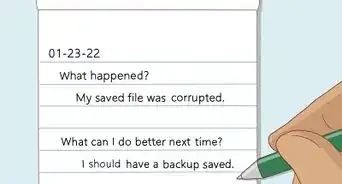This article was co-authored by Meredith Walters, MBA. Meredith Walters is a Certified Career Coach who helps people develop the skills they need to find meaningful, fulfilling work. Meredith has over eight years of career and life coaching experience, including conducting training at Emory University's Goizueta School of Business and the US Peace Corps. She is a former Member of the Board of Directors of ICF-Georgia. She earned her coaching credentials from New Ventures West and a Master of Business Administration from the University of San Francisco.
This article has been viewed 34,244 times.
Everyone wants to be that person who is always raving about how great their job is. Unfortunately, no one likes their job 100% of the time, but there are ways to enjoy and be grateful for your job instead of hating it. See step 1 to get started changing your attitude about your job.
Steps
Getting More Satisfaction from Your Job
-
1Practice gratitude. With a job you hate, love, or are indifferent to, it can be difficult to remember the good portions of it and the reasons you have to be grateful for the job. Practicing gratitude about your job can make it easier to cope with it if you hate it, and remind you of all its excellent qualities when you are more positive towards it.
- Keep a gratitude journal that is only for your job. Every day come up with at least 3 things that you are grateful for about your job. This could be something like "sun was coming through my work window" or "the cute delivery girl smiled at me" or "I got a raise today." Even if you aren't feeling particularly grateful for your job that day, try to find just 3 things that you can focus on.
- try to come up with ways that this job is good for you. It could be that it brings you enough money to buy that new book series you wanted, or is close to your house so you don't have to commute far.
-
2Find at least one bright spot. Even if it's an especially difficult job to like, having at least one bright spot to look forward to during your work day can make all the difference. Even if this bright spot happens to be your lunch hour.
- This step goes beyond simply finding things to be grateful for. If you dread going to work in the morning, focus on that bright spot so that you convince yourself into being more excited for work.
- For example: before you get up in the morning (especially if it's early and your alarm has just gone off), lie there for a moment and call up that bright spot (getting to see and flirt with your cute coworker). During the day, when that bright spot happens, stop and think "I am grateful."
Advertisement -
3Look at the skills and knowledge you're gaining. Perhaps now you have experience dealing with a difficult boss, or you are more effective at time management because the job has forced you to be creative. There's an opportunity to gain insight in every position you have, whether that position is high or low, even if the only insight you gain is that you don't like the job.
- Some people focus on the skills they develop during a job because they are beneficial in helping them climb up the career ladder. If you're stuck at a lower-level advertising job where you do all the work and get none of the credit, for example, you can take solace in the idea that the skills you're gaining now will eventually help you get a better position.
- Others focus on knowledge they gain while at the job. Let's face it, a lot of jobs aren't the greatest. The pay is low, the hours are bad, and the stress is high. If the only knowledge you take away from the job is that it's not a job you want to be doing the rest of your life, that's important. Use that knowledge as motivation in finding a new job — something that you actually like doing.
-
4Focus on the importance of the work itself. Figure out why the work you do is important and what your presence means to your place of employment. There is always something that you bring to the table, even if it's only your strong work ethic and quick sandwich making skills.
- Remember, each person who is part of a workplace brings something important to their job. Focusing on what you do that is important will help you better value your job and your place in it.
- Remind yourself of the importance of the job itself. Every job is important if you look at it from the right angle. If you work in a coffee shop, for example, tell yourself how the people who come in are getting a needed pick-me-up and they wouldn't get that without you and the work you do.
-
5Be realistic. You're not going to love, or even enjoy, every single second of your workday or every single task that you're asked to do. If you're pushing yourself to "love" your work regardless of the more difficult aspect, you'll be more likely to find yourself dwelling on the difficult aspects, instead.
- Give yourself permission to have days where you simply don't want to go to work, or don't enjoy yourself there, even when you're practicing gratitude and finding bright spots. The problem is when that is the only way you look at your job. Occasional down days and irritations are bound to crop up.
- When something happens that irritates or frustrates you, remind yourself that the specific situation is what is frustrating, not necessarily the job itself. This will make you less likely to descend into a downward spiral where you begin to focus only on the irritating aspects of the job.
-
6Develop a professional side project. Sometimes you need to do something for yourself that can relate to your work. This could be anything from writing blog posts about the service industry, to developing a new way of structuring your company.[1]
- Consider what might help make your job, or further marketability, better. Is there a better way to do your job? Is there a way to do things faster? Could you make the copier work better and break less often? Doing any of these things will demonstrate your creativity and your initiative and will give you a purpose.
-
7Make the job better. Sometimes there are ways to improve your job so that it goes from terrible or soul-sucking to much more manageable. This may mean having a talk with your boss, it could mean cutting down on your hours, and so on.
- For example: if it's a coworker or your boss who is making your life miserable at work, you may want to have a private talk with them. They may not realize what they're doing is affecting you so negatively. Even if they do realize, calling them on their behavior (especially if you can offer reasons why they need to change) can do a lot to improving things for you.
- Set boundaries. If you work too many hours (or lots of overtime for which you aren't really being paid) discuss this with your supervisor. If there is an unspoken rule that you have to work overtime, don't fall into the trap.
-
8Quit if you can't stand your job — you only live once. Sometimes you really have to just quit the job that is sucking your soul from your body. Start quietly looking for a new job, maybe in an area that you're more suited for, or something you might prefer doing.
- Decide if you really can't stay at the job you're at. This means that the job is affecting your mental or physical health, or if you're being abused by management or a coworker, etc. if you've tried to improve your situation and can't, it's probably time to move on.
- Try to avoid leaving your job until you have another job, but remember, there won't always be a safety net into which you can leap. You may have to be prepared to scrape yourself off the bottom, if things really don't work out. This does not mean you should stay at a job that you truly cannot stand.
Improving Your Workplace
-
1Value the people you work with. Even if you don't always like the people with whom you work, it creates a good atmosphere when you find ways to avoid taking them for granted. Just realizing and acknowledging how each person contributes (even if it is only a little!) to the company can make a huge difference.[2]
- Say "thank you" to the people you work with. It can be for more general things, like they cleaned up in the kitchen after using it, or it can be for the work they've done. Say things like "Thank you so much, John, for putting in all that extra work on our presentation. You've really make the presentation so much better," or "Thank you, Jane, for fixing the copier yet again. You really know how to work that thing!"
- Acknowledge each person's value. Each person who works at a place of employment has intrinsic value, as well as value to do with their job. The customer service rep who answers the phone all day is the face of the company to the customers, the dishwashers in the back kitchen is making it so that you have clean dishes to use throughout the day, the person who cleans the bathrooms makes the work environment habitable. Pay attention to all the people in your organization.
-
2Remember and use peoples' names. Instead of a generic "Hey, how ya doing?" get in the habit of saying "Hey, Abby, how's life treating you?" It turns out that a part of our brains lights up when we hear our own names being spoken, increasing the warmth we feel for others.[3] Being happy at work in large part depends on being happy with coworkers, and your relationship with coworkers can be improved simply by slipping a person's name into a sentence. So do it: Use names more often and see work get better.
-
3Support and encourage one another. To create a more positive environment that's better to work in you have to find encouragement and support in the people with whom you work. You're going to have to see and cooperate with these people every single day, so finding ways to do that will make your life there much happier.
- Foster trust by starting each interaction with the basic assumption that you can trust your coworker. This means trusting them to do their job, trusting them to work positively with you. Doing this will create the expectation of trust, and make your coworkers more likely to step up and earn your trust. Will people still fail your trust? Of course, but this way you're more likely to foster more trust, and those times when people don't follow through will be aberrations.[4]
- If there are people that you don't like or who have a negative impact on you, minimize the time you spend with them as much as possible. Don't be rude. For example, if Sally, rude office gossip, comes into your workspace, give her a few minutes of your time and then say, politely, "Hey, I really have to get this finished. I'll catch you with you later."
- Do what you want others to do. This means doing your work in a timely manner, being on time to work, and not passing around nasty or mean gossip about your coworkers. Modeling this behavior (without telling people they should act more like you, and doing stuck-up things like that) can make people more likely to want to act that way themselves.[5]
-
4Find inspiration in your work. Your job might be something like cleaning hotel rooms, or serving people sandwiches, or it could be something big in banking. Whatever it is, try to find make something inspiring out it, even if it's only inspiring to you. You get to decide whether the work you do is important.
- Look at the people who inspire you, including famous people. For example: you don't have to turn into Mother Theresa, but you could try giving a helping hand to some of the struggling people in your company (like offering to mentor them, or giving them positive feedback, etc.).
- Start a creative project, at your job or outside of (but link to) it. A good way to keep inspiration flowing is to have a creative project that you're working on. This could be something as simple as trying new ways of doing your work (turning the sandwiches you make into works of art; improving your latte making skills until you can make coffee art; reorganizing your cubicle so it is more conducive to working).
-
5Have fun with your colleagues. Even if you don't exactly enjoy what you do, finding ways to have fun with your colleagues can make the work go by much faster.[6] You don't have to slack on your job, or be cruel, to have fun, either.
- Have a whiteboard where you write down the funniest things that people have said that day (as long as you aren't repeating mean or rude things).
- Start a really bad joke contest and have some sort of silly prize for the winner. Again, avoid cruel jokes (racist jokes, sexist jokes, rape jokes, etc.).
Building Your Life Outside of Work
-
1Know how your work life can affect your outside life and vice versa. What we do at work has meaning at home. And how we feel at home gets translated into how we feel at work. It's a cycle, where one part of the equation influences the other. Focusing on maintaining a good "work/life balance" will help you make both parts even better. Here are some ideas about what you can do outside of work to make the time that you do spend in the office even better.
-
2Invest energy in your friends and family. People have a tendency to get wrapped up in their own lives, especially in their jobs. Suddenly you find that it's been over a year since you last spoke to your friends, because all your energy and attention has been going into staying late at work to get that promotion.
- Having a strong community of friends and family is incredibly important to your overall health. People who have strong connections tend to live longer and feel more fulfilled in their lives, which in turn make them happier in their work lives, as well.
- Set up a time with your friends each month when you can meet. It can be something like meeting for breakfast every first Friday of the month. Then the date is on people's calendars and, as it's monthly, if they can't come that month, they can come at a later date.
- Make sure you're spending time with your family (spouse, children, etc.). Even if you're tired, taking some time to ask them about their day and helping out with the household chores can make home life much happier and more fulfilling.
-
3Follow your passions. Most people aren't going to find a way to incorporate their passions into their jobs. Don't let this mean your passions fall by the wayside because you're focusing exclusively on work. Find ways to pursue them outside of your job, so you don't need your job to fulfill that need.
- For example, if you're really into rock climbing, you don't necessarily need to be a rock climbing instructor, or somehow do that as your job to be happy and fulfilled at work. You could do a job that helps fund your passion, or that allows you to take vacations to go on longer climbing trips.
- Do something with art or something creative. Take up knitting, or participate in some free drawing classes (you can sometimes find free life drawing at colleges). This will help you feel like you're accomplishing something important, will give you a creative outlet (if you're not getting it at your job).
-
4Get outside of your comfort zone. Trying out new things in your life can make it easier to handle the surprises life has a way of throwing your way. It's also a great way to build inspiration in all different areas of your life, including in your life.
- Doing new things doesn't necessarily mean spending piles of money on a worldwide trip, or skydiving class (although if you can do that and want to, great!). It means trying out different things in your community that challenge you: taking a cooking class, or going to free lectures at your local university, doing guerrilla gardening, and so on.
- You can also do things like work at a soup kitchen or shelter. These can get you out of your comfort zone, remind of the positive things in your own life (like food, a roof over your head, your health, a job, etc.), while doing positive work in your community.
-
5Maintain your health. Stresses at work and in your life can cause you to get ill, both in body and in mind. Find ways to make sure that you're getting the support and healthy practices that you need to keep going through the stress and through the potential difficulties.
- Exercise is incredibly important to your health, physical and mental. It releases chemicals like endorphins which help you feel happier. Exercise can ease depression and anxiety and it can boost your energy level. Try for at least 30 minutes of exercise each day. If you are feeling sleepy during your work shift, get up and move around (walk the stairs in your building, take a walk around the block, do some jumping jacks). It will work better than an energy drink to keep you going to the end of your shift.
- Eating right means you're putting food in your body that helps to fuel it and make it work at optimum levels. Frequent consumption of foods that are sugary or high in salts and saturated fats, can make your mood worse. Go for protein (meat, nuts, soy, etc.) and lots of fruits and veggies. For carbohydrates, go for the better ones (brown rice, sprouted wheat, oats).
- Get enough sleep. Most people in the United States (especially those who work) are operating on a sleep deficit, which will make you less effective and happy at your work and in your life. Try for at least 8 hours each night, the more hours you get in before midnight the better rested you'll be. Turn off all electronics at least 30 minutes before bedtime.
-
6Take vacation days. A lot of people never end up able to, or willing to, take their vacation days, even if their jobs offer paid vacations for their employees. Vacations give you the distance from your job that can help you decide whether it's a good fit for you, if it's really as bad as you sometimes think. Or they can simply rejuvenate you so that you can get back to work with a better attitude.
- If you can't really take a whole vacation, try for at least a few days off each year, where you simply allow yourself to relax and you take care of yourself.
Expert Q&A
-
QuestionHow can I be happier at work when I hate it?
 Meredith Walters, MBAMeredith Walters is a Certified Career Coach who helps people develop the skills they need to find meaningful, fulfilling work. Meredith has over eight years of career and life coaching experience, including conducting training at Emory University's Goizueta School of Business and the US Peace Corps. She is a former Member of the Board of Directors of ICF-Georgia. She earned her coaching credentials from New Ventures West and a Master of Business Administration from the University of San Francisco.
Meredith Walters, MBAMeredith Walters is a Certified Career Coach who helps people develop the skills they need to find meaningful, fulfilling work. Meredith has over eight years of career and life coaching experience, including conducting training at Emory University's Goizueta School of Business and the US Peace Corps. She is a former Member of the Board of Directors of ICF-Georgia. She earned her coaching credentials from New Ventures West and a Master of Business Administration from the University of San Francisco.
Certified Career Coach Reach out to your supervisor and ask them if there are any projects that fall into a category that you're passionate about. See if there's a way you can work on them since you'll be more driven to work if you feel like you have a purpose.
Reach out to your supervisor and ask them if there are any projects that fall into a category that you're passionate about. See if there's a way you can work on them since you'll be more driven to work if you feel like you have a purpose.
Warnings
- Nothing is permanent. Chances are, your job won't be permanent either. Feeling like you're stuck will make it harder to leave the job when you need to and it will actually make the job itself more stressful. On the flip side, remembering that a really lovely job might not be forever, is a good way to remember to appreciate it.⧼thumbs_response⧽
- Don't make your job your identity, no matter how much you might love your job. When it's your identity you put all your happiness into its success or failure. Remember, no matter how good, a job is only a job.⧼thumbs_response⧽
References
- ↑ http://www.forbes.com/sites/work-in-progress/2011/08/10/what-to-do-when-you-hate-your-job-and-cant-leave/
- ↑ Meredith Walters, MBA. Certified Career Coach. Expert Interview. 22 November 2019.
- ↑ http://www.ncbi.nlm.nih.gov/pmc/articles/PMC1647299/
- ↑ http://www.businessinsider.com/how-to-get-your-coworkers-to-trust-you-2012-3
- ↑ http://money.usnews.com/money/blogs/outside-voices-careers/2013/08/29/tips-for-finding-reigniting-and-building-inspiration
- ↑ Meredith Walters, MBA. Certified Career Coach. Expert Interview. 22 November 2019.














































































